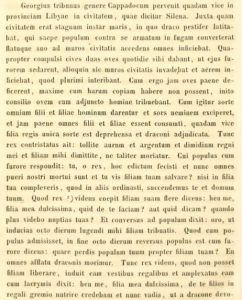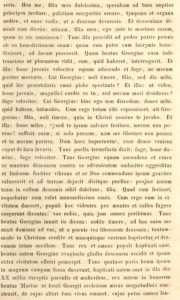| Saint and Dragon | Date of Text | Citation | Text/edition | Language | Translation |
| George [c] | AD 1263-7 | Jacobus de Voragine Golden Legend 58 | Graesse 1850 | Latin | DSS no. 161; Ryan 1993 |



Translation:
George, a military tribune from Cappadocia, arrived by some chance at a city called Silena in the province of Libya. Near this city was a lake swamp like a sea in which a pestilential dragon [ draco ] used to lurk. Many times had the people taken up arms against it, only for it to turn them to flight. It would approach the walls of the city and kill everyone with its breath. Of necessity, accordingly, the citizens used to give it two sheep every day to placate its anger. Otherwise it would attack the city walls and infect the air, from which many would die. When, in due course, they had almost run out of sheep, and since, in particular, they could not find a supply of them, they took counsel and gave the serpent a single sheep with a human being in addition. So everyone’s sons and daughters were being given to the serpent by lot, and no one was excluded from the lot. When almost all the sons and daughters had been eaten, by some chance the king’s only daughter was selected by lot and destined for the dragon. Then the king, in his grief, said, ‘Take gold and silver and half my kingdom and spare my daughter from dying in such a way.’ The people responded to him in anger, ‘It was you, king, that made this ruling, and all our children are now dead—and you want to save your daughter? Unless you do with your daughter what you have ordained for the others, we will burn you and your household.’ Observing this, the king began to weep for his daughter, and said, ‘Alas me, my sweetest daughter, what am I to do about you? Or what am I to say? When now will I see your wedding?’ He turned to the people and said, ‘I beg you to allow me a postponement of eight days in which to grieve for my daughter.’ The people conceded this, but at the end of the eight days they returned and said in anger, ‘Why are you destroying the people for the sake of your daughter? See, we are all dying because of the dragon’s breath.’ Then the king, realising that he could not spare his daughter, dressed her in royal robes, embraced her tearfully and said, ‘Alas me, my sweetest daughter, I used to believe that you would suckle sons at your royal bosom, and now you are off to be eaten by a dragon. Alas me, my sweetest daughter, I used to hope that I would invite princes to your wedding, decorate the palace with pearls, listen to the music of drums and pipes, and now you are off to be eaten by a dragon.’ He kissed her warmly and sent her off with the words, ‘Would that I had died before I lost you in this way, my daughter!’ Then she fell at her father’s feet and sought his blessing. Her father tearfully blessed her, and she went off to the lake. By chance the blessed George was passing that way. When he saw her weeping he asked her what was the matter. She said, ‘Good young sir, get on your horse quickly and flee, lest you be killed alongside me.’ George replied to her, ‘Do not be afraid, daughter, but tell me what you are waiting for here whilst all the people watch.’ She said, ‘As I observe, good young sir, you have a great heart, but do you want to be killed alongside me? Flee quickly.’ George replied, ‘I will not depart from here until you tell me what the matter is.’ So when she had explained the whole story to him, George said, ‘Do not be afraid, daughter, because I will help you in the name of Christ.’ She said, ‘But, good soldier, hurry to save yourself. Do not be killed alongside me! It is enough that I alone should die, for you could not deliver me and would perish alongside me.’ As they were saying this, lo! the dragon arrived and raised its head from the lake. Then the girl, shaking with fear, said, ‘Flee, good lord, flee quickly.’ Then George got on his horse and, protecting himself with the sign of the cross, attacked the dragon boldly as it came against him. Bravely hurling his spear and entrusting himself to God, he dealt it a severe wound and dropped it to the ground. He said to the girl, ‘Throw your belt around the serpent’s neck, daughter. There is no need to hesitate.’ When she had done this, it followed her like the tamest dog. When, accordingly, she began to lead it to the city, the crowds began to flee over hills and mountains upon seeing it, saying, ‘Woe for us, because now we shall all die!’ Then the blessed George signalled to them and said, ‘Do not be afraid, for the Lord sent me to you for this, that I should liberate you from the punishments inflicted by the dragon. Only believe in Christ. If every one of you is baptized, I will kill this serpent.’ Then the king and all the crowds were baptized, and so the blessed George drew his sword and killed the serpent. He ordered it to be carried out of the city. Then four yoke-pair of oxen took it out into a great field. On that day twenty thousand people were baptized, not counting women and children. The king built a church of amazing size in honour of the blessed Mary and the blessed George. A lively spring gushes forth from its altar, the drinking of which cures all the sick. The king offered unlimited money to the blessed George, but he refused to accept it and asked that it be given to the poor. Then George gave the king brief instruction on four points, namely that he should care for God’s churches, hold his priests in honour, heed the divine offices carefully and always remember the poor. He kissed the king and left. However, in some books one reads that George protected himself with the sign of the cross and attacked and killed the serpent already as it was making its way towards the girl to eat her.